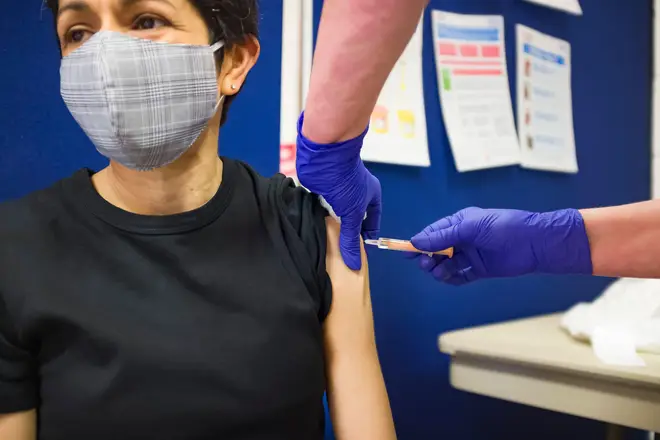
Nick Abbot 10pm - 1am
27 August 2021, 09:49

The risks of developing a blood clot are "substantially higher" after catching coronavirus than following a Covid vaccine, research shows.
Scientists looked at more than 29 million people aged 16 or older who had a first dose of either vaccine in England between December and April.
Their findings suggest the risk of thrombocytopenia, a condition where the patient has a low count of cells, known as platelets, that help the blood clot, in someone with coronavirus is almost nine times higher than in someone who has had one dose of the AstraZeneca jab.
Read more: Denmark, the Azores and Switzerland go on green list in latest travel update
The scientists found that an increased risk of stroke was ten times greater in those infected with Covid-19 compared to those who had the jab.

'Just come up with some coherent, logical rules, and stick to them.'
One of the lead researchers of the study has said that the vast majority will be "absolutely fine" after their coronavirus vaccine.
Professor Hippisley-Cox, professor of clinical epidemiology and general practice at the University of Oxford, said the increased risks they detected were only present for a short time after having the vaccine, compared to a longer period in someone infected with the virus.
She said: "There's always some unanticipated effects with any medicine and I think that this study design is the most robust way of looking at detecting these events and putting them in some context."
Researchers found no association for AstraZeneca with stroke risk, or Pfizer with increased risk of blood clots.
According to data from Public Health England, the coronavirus vaccine is now estimated to have saved around 100,000 lives.
Read more: Buckingham Palace memorial vandalised amid London protests
Read more: Covid: 'NHS planning vaccine rollout for children from age of 12'
The results of the research came a day after an inquest into the death of award-winning radio presenter Lisa Shaw, who died due to complications of the AstraZeneca vaccination.

Paramedics on break dance in TikTok clip
A coroner ruled yesterday that BBC radio presenter Lisa Shaw died aged 44 in May, just over three weeks after she had her first dose of the AstraZeneca jab.
The coroner said she had developed a vaccine-induced thrombosis and thrombocytopenia, which was described as "a rare and aggressive complication associated with the AstraZeneca vaccine, which was the underlying cause of her death".
But this research indicates that potential risks of the vaccine compared with Covid-19 infection itself are much lower.
Professor Hippisley-Cox said that her death was "very sad".
"But to put it in context, these are very rare cases, and the vast majority of patients will be absolutely fine with these vaccines."
Dr Mike Tildesley, a member of the Scientific Pandemic Influenza Group on Modelling (Spi-M) which advises the Government, was not involved in the research. He said he hoped the new study involving millions of people, "maintains the trust in the vaccines going forward".
Read more: Govt launches campaign to urge secondary school students to get jabbed and tested for Covid
"There are always going to be the tragic cases like Lisa unfortunately, but it still doesn't mean that actually the risks of taking the vaccine are high, it is still so much more risky to catch Covid and develop a blood clot via that route."
The study is thought to be the first to compare the AstraZeneca and Pfizer vaccines with risks from Covid-19 on such a large scale.
Professor Aziz Sheikh, one of those involved in the study, said the increased risk of blood clots seen in their work is similar to other commonly used vaccines in the UK, such as the flu jab.
Professor Hippisley-Cox said: "There's always some unanticipated effects with any medicine and I think that this study design is the most robust way of looking at detecting these events and putting them in some context."